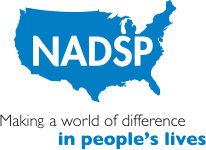
Documentation: People Behind The ‘Paperwork’
The following article is part of an ongoing series about the NADSP Competency Areas. The NADSP Competency Areas offer DSPs the opportunity to address challenges, work on issues identified by the person they support, or assist a person in pursuing a particular goal. Each Competency Area has corresponding skill statements that describe the knowledge and skills DSPs must have to demonstrate competency in each area.
This blog is about the skill statement “The competent DSP maintains accurate records, collecting, compiling and evaluating data, and submitting records to appropriate sources in a timely fashion,” within the NADSP Competency Area: “Documentation.”
Inside The Competency Area
Documentation
Behind every word that a direct support professional writes is a human being. Documentation is critically important for direct support professionals in the field of intellectual and developmental disabilities (IDD) for many reasons. Accurate documentation allows multiple team members to understand an individual’s needs, preferences, and progress, ensuring consistent support regardless of who provides it or when. Proper records help monitor changes over time, assess the effectiveness of interventions, and inform necessary adjustments to support plans.
Detailed documentation helps tailor services to meet each person’s unique goals and preferences, promoting autonomy and quality of life. Along with that, maintaining accurate records is often a legal requirement and helps demonstrate that supports are delivered appropriately and ethically. Documentation also serves as a communication tool among team members, family members, healthcare providers, and others, ensuring everyone is informed and aligned. Proper records can justify the services provided, which is important for funding, insurance claims, and audits. In addition, accurate documentation reflects professionalism and accountability.
Overall, thorough and ethical documentation supports quality, safety, and respectful care, empowering direct support professionals to serve individuals effectively.
The competent DSP maintains accurate records, collecting, compiling and evaluating data, and submitting records to appropriate sources in a timely fashion.
Inside The Skill Statement
The competent DSP maintains accurate records, collecting, compiling and evaluating data, and submitting records to appropriate sources in a timely fashion.
A competent direct support professional recognizes the vital importance of maintaining accurate and comprehensive records. This involves systematically collecting relevant data about the individuals they support, including daily activities, behavioral observations, health status, and progress toward personal goals. Compilation of this information must be precise and organized to create a clear record of ongoing support and development.
The direct support professional and other team members can then evaluate the data to identify trends, determine effectiveness of interventions, and make informed decisions related to support planning. Timely submission of records to appropriate sources, such as supervisors, healthcare providers, or support teams, ensures that essential information is available for ongoing assessment and coordination of services. Accurate record-keeping not only enhances service quality but also supports accountability, compliance with legal and regulatory requirements, and effective communication among team members.
Overall, the competence of documentation practice of a direct support professional are crucial for delivering personalized, safe, and effective support services.
Putting It All Into Practice
There are a number of considerations, tips, and guidance, that direct support professionals can be aware of when it comes to documentation.
Demonstrating Respect
Documenting the lives of people with intellectual disabilities – whether through writing, photography, video, or audio – requires sensitivity, ethics, and a commitment to portraying people with dignity and respect. Avoid using stereotypes, sensationalism, or portraying people as objects of pity or heroism. This must be done thoughtfully.
Use people-first language (e.g., “person with an intellectual disability”) or identity-first language (e.g., “disabled person”), depending on what the person prefers. Avoid infantilizing language and euphemisms like “special needs” (unless preferred by the person). Remember, as was stated earlier, behind every word that you write there is a human being that is being described.
Ensuring Accuracy
A direct support professional can apply effective documentation practices in daily work within human services by consistently recording relevant information about the individuals they support, such as daily activities, behaviors, health updates, and progress toward personal goals. This involves accurately noting changes in behavior, responses to interventions, and any incidents or concerns, ensuring the records are clear, detailed, and timely.
By prioritizing accurate, organized, and timely record-keeping, direct support professionals promote quality care, legal compliance, and effective communication, ultimately enhancing the individual’s well-being and ensuring accountability in their daily responsibilities.
Promoting Inclusion & Transparency
When possible, support people to tell their own stories, in their own words or images. People’s life stories are powerful. Include direct input and feedback from those being documented. Work with self-advocates and disability organizations, and include family members, caregivers, or peers if appropriate. Support staff must always make content accessible.
Using standardized forms and communication tools help maintain consistency and completeness. Additionally, the direct support professional should communicate and submit records promptly to supervisors or team members, fostering coordinated care.
Regularly reviewing documentation helps identify patterns, evaluate effectiveness, and inform future support plans.
Protecting Privacy
Direct support professionals must be mindful of sensitive information and confidentiality. You should ensure that people (or their legal guardians) fully understand and consent to being documented, while defining the purpose of any documentation clearly. Support staff must also educate people about where and how their stories will be shared. Be sure to inform people about any potentially sensitive topics involving what you’re documenting.
You need to teach people (and inform yourself) about the latest and important aspects of Federal HIPAA laws and regulations. Also, be aware of all the limitations of confidentiality that could affect the content of your various documentation responsibilities. You could also become familiar with the NADSP Code of Ethics, as that can inform both how and what you document.
Quick Tips
How can you help embrace this skill statement and implement it? Here are some quick tips!
-
- Always be honest and accurate when you create documentation.
- Always ensure that what you are writing is kept confidential and private.
- Behind EVERY WORD that you write, there is a human being! Be respectful.
- Eliminate distractions when writing your notes, progress reports, and all other documentation.
- As much as possible, try to document anything you can WITH the person you support.
- Along with that, ensure that people are aware of what you write about them.
- When in doubt about what you’re writing, consult with your supervisor.
NADSP Competency Areas
The NADSP Competency Areas offer DSPs the opportunity to address challenges, work on issues identified by the person they support, or assist someone in pursuing a goal.
You May Also Be Interested In …

Let’s Talk: Beyond Companionship: How Dogs Support People To Thrive

Let’s Talk: The Art of Connection: Establishing and Repairing Rapport in Direct Support Settings

Let’s Talk: Summertime and The Living Should Be Easy: Supporting People with Significant Intellectual and Developmental Disabilities in Summer Activities

Let’s Talk: Embracing Diversity Equity and Inclusion: A Pathway to Professional Excellence for DSPs

Let’s Talk: Burnout: Reclaiming Mental Wellness in Direct Support Work

Let’s Talk: Flipping the Switch: Compassion Fatigue to Compassion Satisfaction and Psychological Safety for Direct Support Professionals

Let’s Talk: Sexuality and Healthy Relationship Knowledge is Power

Let’s Talk: Balancing Joy, Boundaries, and Belonging: The Ethical Role of DSPs in Holiday Celebration and Connection

Webinar: The Future of COVID-19 and Vaccines

